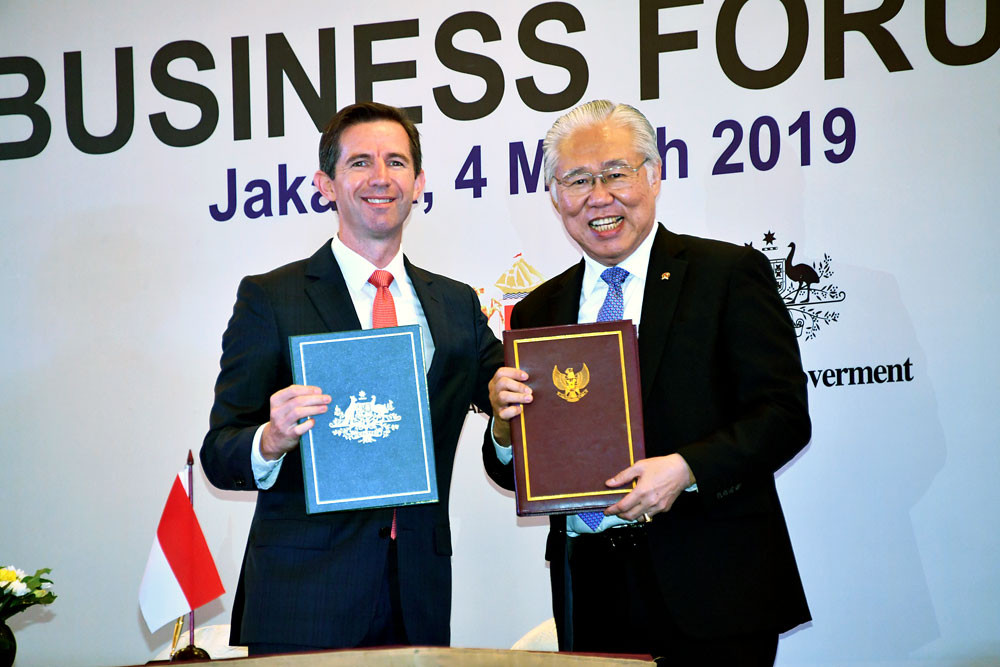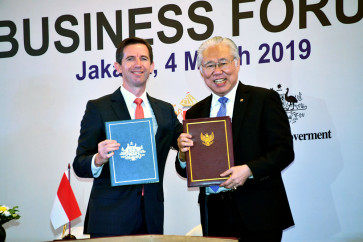Popular Reads
Top Results
Can't find what you're looking for?
View all search resultsPopular Reads
Top Results
Can't find what you're looking for?
View all search resultsBilateral treaty: Can we benefit from IA-CEPA?
Change text size
Gift Premium Articles
to Anyone
 Art of the deal: Trade Minister Enggartiasto Lukita (right) and his Australian counterpart Simon Birmingham hold documents after signing a trade deal in Jakarta on Monday. Indonesia and Australia signed a long-awaited deal after months of diplomatic tension over Canberra’s contentious plan to move its embassy to Jerusalem. (AFP/Adek Berry)
Art of the deal: Trade Minister Enggartiasto Lukita (right) and his Australian counterpart Simon Birmingham hold documents after signing a trade deal in Jakarta on Monday. Indonesia and Australia signed a long-awaited deal after months of diplomatic tension over Canberra’s contentious plan to move its embassy to Jerusalem. (AFP/Adek Berry)
I
ndonesia has just signed a comprehensive economic partnership agreement (CEPA) with Australia, which is a treaty that covers trade, investment and other areas of cooperation.
As soon as this treaty, which is officially called the Indonesia-Australia CEPA (IA-CEPA), is ratified and enters into force, the two countries will start a new era in their economic relationship.
It is understood that the correlation between CEPA and foreign investment flows is still a contentious issue. Some researchers have concluded that there is no significant correlation between the two while others concluded otherwise. This article will focus on the scenario of a positive impact of the cooperation.
Indonesia and Australia actually have already entered similar treaties, with both countries being signatories to the ASEAN-Australia-New Zealand FTA (AANZFTA). Unfortunately, although AANZFTA is already implemented, some provisions have not been concluded (subject to a work program). Moreover, the AANZFTA, as a regional agreement, cannot accommodate the specific concerns of Indonesia and Australia in their bilateral relationship.
IA-CEPA is designed to provide a high degree of legal certainty for foreign investors with the aim of convincing them to invest in Indonesia or Australia. The treaty includes many commitments to protect foreign investors; some of the key measures of protection will be highlighted here. First, the host country should accord investors and their investment fair and equitable treatment. Second, the host country should ensure nondiscriminatory treatment of foreign investors.
Third, the host country should allow foreign investors the flexibility to transfer capital and funds. Fourth, expropriation will not be allowed except with strict conditions. Lastly, there is a dispute settlement mechanism under which foreign investors have the right to directly make claims vis-à-vis the government of the host country. All of those commitments definitely will boost the level of investor confidence.
With regard to Indonesia’s foreign investment strategy, the CEPA plays a crucial role, as neighboring countries have actively entered into international investment treaties. We have seen Vietnam and Malaysia take part in mega treaties like the Comprehensive and Progressive Agreement for Trans-Pacific Partnership and join the Regional Comprehensive Economic Partnership Agreement (RCEP). In its bilateral ties with Australia, Malaysia concluded a similar CEPA deal in 2013. The competition is tough.

















